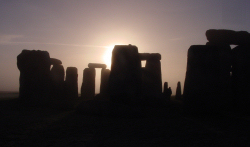Our word myth comes from the Greek word mythos (speech). The Greek myths, as we know them, were based on the oral tradition and passed down. These were stories of gods and heroes which had become well-established by the time they were written down. There were many versions of these myths and their origin cannot be determined. Most Greek myths depict some kind of conflict: between male and female, man and god, god and goddess, etc. They also commonly involved extreme circumstances in which humans transgressed against established moral behavior. Myths were usually the domain of the artists, politicians, poets, philosophers and playwrights. These tales were accepted as true and were used to illustrate and prove moral, political and intellectual ideas.
The Romans took many of the gods and mythologies from Greece but changed them to relate to their own concerns. The Romans also borrowed deities from other cultures since their Empire stretched to great lengths. The Romans were more concerned with material matters such as agriculture rather than mythology. The Romans did not have a creation myth and their gods and goddess seem rather lackluster compared to the Greeks.
The main Greek pantheon resided on Mount Olympus, the highest mountain in Greece. Chief deities were Apollo, Aphrodite, Ares, Artemis, Athena, Hades (Pluto), Hephaestus, Hera, Hermes, Hestia, Poseidon, Zeus. They had many other major and minor gods and goddesses.
The Roman equivalents of the Greek pantheon were Jupiter, Apollo, Neptune, Mars, Mercury, Vulcan, Juno, Diana, Minerva, Venus, Ceres and Vesta.
Zeus (Jupiter) was the King of the Gods. He controlled lightning, thunder and had the power to squeeze clouds to supply rain. The Greeks believed Zeus to be a rather promiscuous god. Most of his children were not conceived by his wife Hera but by the many women with whom he had affairs. He fathered Athena, Apollo, Aphrodite, Artemis, Hermes, Heracles, Helen of Troy and Persephone among others.
Hera (Juno) was the Queen of the Gods, wife and sister of Zeus and goddess of the family. Her anger at her philandering husband caused Hera to keep a constant eye on Zeus. She was very jealous and when she discovered an infidelity the women and sometimes the offspring would suffer her wrath.
Poseidon (Neptune) was the God of the Oceans and brother of Zeus and Hades. He ruled the waves. The three-pronged trident was his symbol and was equivalent to Zeus’ thunderbolts. Like his brother Zeus, Poseidon possessed a voracious sexual appetite and was often unfaithful to his wife Nereid. Because Poseidon was indifferent about the physical characteristics of his sexual infidelities, he often fathered bizarre looking creatures. He is said to be the father of the Gorgon Medusa, the Giant Chrysaor and the Cyclops among others.
Hades (Pluto) was the King of the Dead, Lord of the Underworld and god of wealth. He is not the god of death. Hades was a just and fair god. He governed the underworld by a strict set of rules and rarely punished anyone. He was the only god not welcomed on Mount Olympus.
Demeter (Ceres), sister of Zeus, Hades and Poseidon, was the mother/goddess of fertility and goddess of the earth’s vegetation. She had a single daughter, Persephone, by her brother Zeus. She was known for her maternal instincts.
Aphrodite (Venus) was the Goddess of Romantic and Sexual Love. The Greeks saw her as the personification of physical beauty. It was she who caused single people to fall in love and older, married people to commit adultery.
Ares (Mars) was the God of War. The Romans gave him the character he is known for, that of a brave and brilliant warlord. He was romantically involved with Aphrodite.
Apollo was the god of light and truth. His twin sister was Artemis (Diana). He was also the god of wisdom, medicine, prophecy and music.
Artemis (Diana) was the goddess of the hunt and twin sister of Apollo. She is also known as the goddess of childbirth and children since she helped deliver her twin brother. She was considered a great beauty but remained forever chaste.
Athena (Minerva) was the warlike virgin goddess of wisdom. Her animal avatar was the owl. During the Trojan War Athena took the side of the Greeks. Her cult city was Athens.
Hephaestus (Vulcan) was a Greek smith and earth god. He was married to Aphrodite and caught his brother Ares and his wife in an act of infidelity.
Hestia (Vesta) was goddess of the hearth. She never took part in wars or disputes and was worshipped for her humanity. She was considered the most benign of the gods. Most households would have a shrine to her.
|

